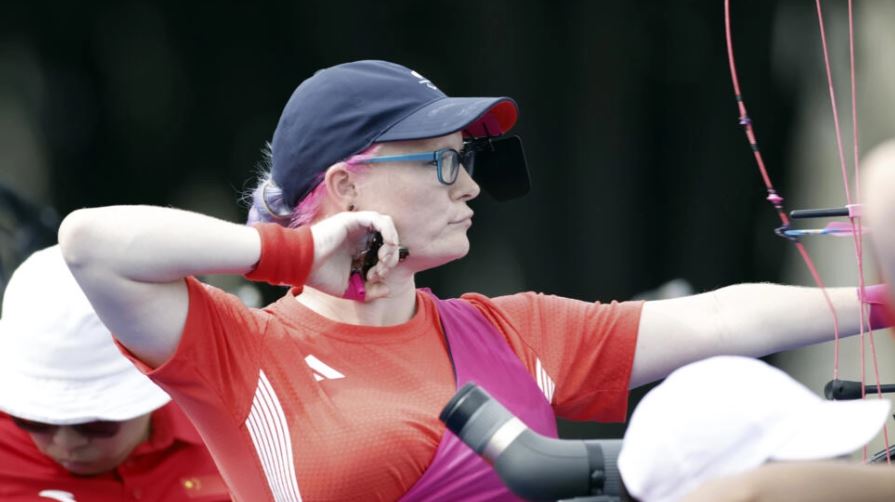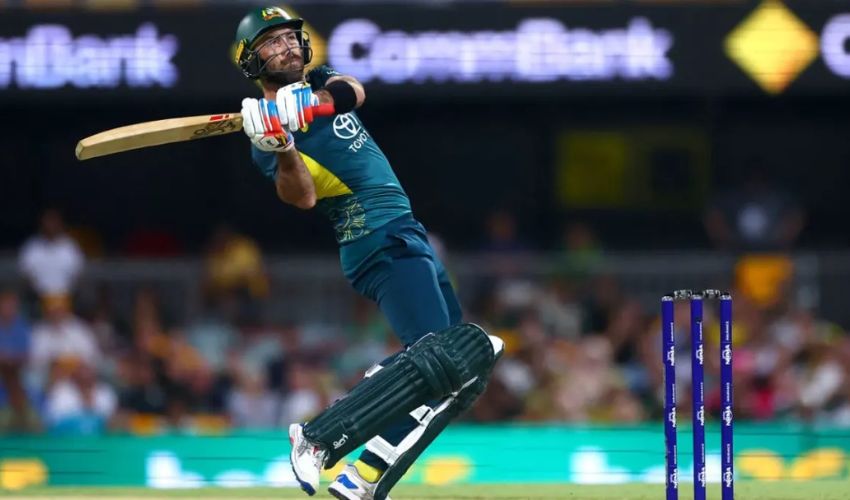Jodie Grinham is hard to miss. The British archer's brilliant pink fringe peeks out from under her baseball cap, perfectly paired with the elaborate cables and pulleys of her rose-coloured compound bow. A hot pink sling loops under her right shoulder, steadying her back as she threads arrow after arrow through the wheels and wires of her weapon of choice.
Grinham is also seven months pregnant – the first openly pregnant woman to have competed in the Paralympic Games since their beginning. The 31-year-old, who was born with no fingers and half a thumb on her left hand, won silver in the mixed doubles in Rio. On Saturday evening, at the lavish Esplanade des Invalides, she became the first person to win a medal in the Paralympics while openly pregnant.
It's been something of a team effort. Speaking to reporters after her victory, Grinham said that her unborn child had been kicking furiously throughout the competition.
“Oh my gosh, the baby hasn’t stopped!” she said. “It’s like the baby’s going, ‘what’s going on, it’s really loud, mummy what are you doing!’ But it’s been lovely, it’s been like a little honour to know that the baby’s there and just a reminder of the little support bubble that I’ve got in my belly. I wouldn’t change it for the world.”
For the scant 30 seconds given to them to make each shot, every archer is slave to the wind and its whims; the world's flags rimming the arena hang lank against the chalk-grey sky one moment, flailing and furious the next. And while the crowd is trying to be on its best behaviour, a thousand people thronging the stands on a Saturday night can't help but bring their own distractions.
In the face of this sensory onslaught, the last thing you'd think you'd need would be an unborn babe belting you in the kidneys.
“It was really starting to worry me – that the baby’s going to move and I’m going to be at full draw and it’s going to affect my shot,” Grinham said. “And my coach and I spent a long time doing little pregnancy preps of her moving me, and moving the bump, so I could get used to that feeling.”
By practising these worst-case scenarios, Grinham said, she had learned to maintain her composure even at the critical point before each arrow's release.
“So even when I had shooting matches today, I’d be up at full draw, I’d feel that sensation, and it’s almost like you acknowledge it and go, ‘I know you’re there, mummy loves you, I’ll cuddle you in a minute’ ... and then I’d carry on doing my process," she said. "And then I’d give him like a little stroke after, like, ‘it’s okay, everything’s fine’.”
Archer Jodie Grinham touches her tummy during the Paralympic Games in Paris, on Thursday, August 29, 2024. Grinham is 28 weeks into her pregnancy.
Archer Jodie Grinham touches her tummy during the Paralympic Games in Paris, on Thursday, August 29, 2024. Grinham is 28 weeks into her pregnancy. © Felix Scheyer, AP
Grinham has been open about her and her partner's struggles to conceive, having had three miscarriages before the birth of her first child. When he came, he came early; Grinham went into labour at 28 weeks. Her son spent his first 10 days in an incubator and another five weeks with a nebuliser. He's two years old now.
Last weekend, 28 weeks into her current pregnancy, the baby seemed to stopped moving. Grinham spent two days in a Paris maternity ward as the doctors prepared for the possibility of another early birth. Just days ahead of her first Paralympic event, she seemed on the brink of reliving some of the hardest days of her life.
“I’ve been in and out of hospital this week, it’s been really difficult," she said. "My partner’s got a baby bag ready just in case he’s got to get over to Paris.”
That day still hasn't come. On Saturday, Grinham shot her way straight through the elimination rounds, finishing the final ends of her first two matches with perfect scores – perfectly timed, as it happened, to clinch each victory.
Her uncanny aim faltered in the semi-finals in the face of Turkish archer Oznur Cure Girdi, who went on to win the gold in a convincing victory over Iran's Fatameh Hemmati. Grinham's loss to Girdi meant that she would be fighting for the bronze against her British teammate Phoebe Paterson Pine, who competes in a wheelchair.
It was agonising to watch. Although both archers seemed evenly matched, with each one racking up a perfect score in their second end, Paterson Pine pulled ahead at the mid-way point and held her lead to the end of the match. Finally, it came down to the last arrow. Grinham's struck true, putting her just one point away from a draw. To win, Paterson Pine would have to hit a 10-point bulls-eye, or else go into a tense final showdown to break the tie.
“I’ve already achieved what women out there won’t have done before, and actually I hope that is enough,” she said. “The rest is all for me – if I can go out and win it, absolutely great, if women can find that inspirational, fantastic, but regardless, sport is sport, pregnancy is such a natural thing, there shouldn’t be a separation. Let’s put it together and do everything we can.”
Grinham said that she hoped her performance could show women that they didn't need to choose between a pregnancy and their passions.
“Just do what you want to do – if you’re happy, and you’re healthy, and the baby is healthy and everything is safe, then just keep doing it," she said. "There is no stigma – the stereotype of things is completely irrelevant. If you feel that you’re able to do it, then go and do it. You want to start jogging, you want to go to the gym, it shouldn’t matter, it shouldn’t have an effect on you and baby. If the doctor says it’s fine, then go and do it."



























